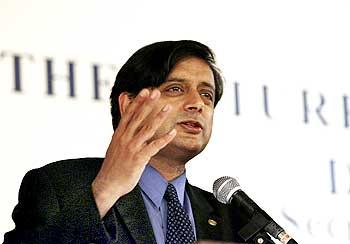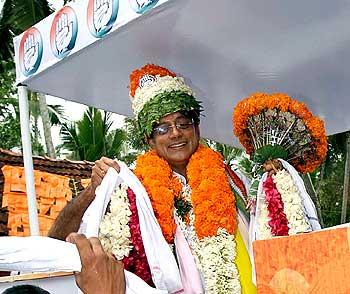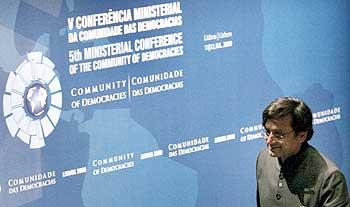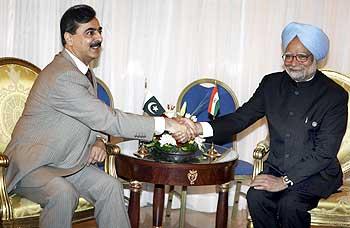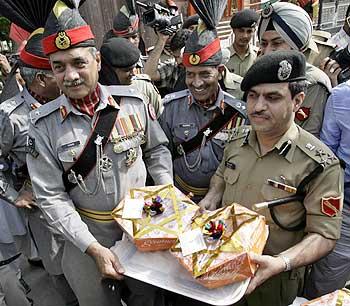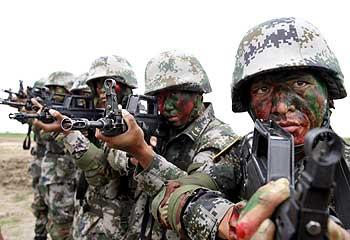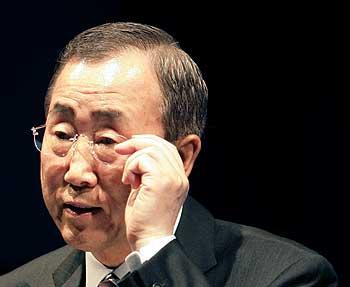 | « Back to article | Print this article |
'Dramatic transformation of my life'
The first-term MP from Thiruvananthapuram, who is in charge of Arabia, Africa and Latin America, described the controversy as 'silly-seasoned' in a Twitter post. 'I would be ashamed if I was spending the people's money. But I'm not, I'm spending my own savings,' Dr Tharoor wrote.
His United Nations career began when he was just 22 in 1978. He joined the staff of the United Nations High Commissioner for Refugees in Geneva, before going on to hold key responsibilities over the years. As India's candidate for UN secretary general to succeed Kofi Annan in 2006, Dr Tharoor mounted a spirited campaign and ended up finishing a close second out of seven contenders.
There was a 'what next' hanging in the air over his name when he left the UN on March 31, 2007. A likely avenue for the author of 11 books and hundreds of articles and op-eds would have been literature, and Dr Tharoor, in fact, said he looked on his exit from a full-time UN position as giving him the opportunity to return to his first love, writing.
Ironically, it was when his career in the public forum seemed to the untutored observer to be over that the World Economic Forum in Davos, Switzerland, recognised that Dr Tharoor had much more to give, and in 2008 named him a 'Global Leader of Tomorrow.'
Contesting the general election in India seemed to the observer an improbable adventure when Dr Tharoor first announced for the seat under the Congress party symbol. Again, however, he reinvented himself for the needs of street-level campaigning, shedding his suits and suave demeanor that comes naturally to the London-born internationalist in favour of the mundu that is the traditional attire of the average Malayali, and mounted a grassroots campaign fuelled by the technological toys of mass communication, to emerge with one of the biggest majorities in the 2009 election cycle.
The magnitude of that win made it a certainty that he would be inducted into the government; his posting in the external affairs ministry seeks to take advantage of the years Dr Tharoor has spent building contacts and expertise in the international arena.
The minister spoke to Rediff India Abroad's Aziz Haniffa in an interview a couple of weeks before he, along with his boss, Minister for External Affairs S M Krishna, made the news for staying in five-star hotels after taking office.
From UN diplomat to a politician in Kerala and now a minister: how has the transformation been?
It's been an extraordinary experience. You may remember that at one point I said to you, I am re-booting. Now it turns out that I've done more than re-booting -- I've changed the operating system completely. It's been a dramatic transformation of everything in my life.
And I have to admit it's probably something -- it's a rare privilege to be able to go through because within a matter of months, I have changed my residence, changed my profession, changed my daily thrust of work, and it's in some ways quite invigorating.
In other ways, of course, there are adjustments to be made, which is healthy for human beings at some stage in their life to re-assess really what they are doing and to do things differently. So I am really very grateful for the opportunity.
'It's a bit unfair to typecast Indian bureaucracy only negatively'
Many of the bureaucrats in the ministry of external affairs are my friends, so I see them principally as friends and not principally as bureaucrats. But I also think that to some degree, bureaucracy in our system has strengths as well as demerits.
People tend to focus on the demerits -- they see bureaucrats as people who are set in their ways, who are more concerned with rules and procedures than with outcomes, and so on. But I think that's a little unfair.
In a vast country like ours, you do need a system that welds together the disparate interests of various parts of the country and at the same time manages to bring together a certain unifying approach in terms of policies, regulations and so on, under the law of the land.
That is the duty of the bureaucracy, and therefore sometimes you do find that people are critical of the way in which the bureaucracy does it work.
I do think it's a bit unfair to typecast them only negatively.
In my ministry, we have some of the best and the brightest in government service because the Indian Foreign Service, particularly those who are now in their 40s and so on, represent a time in which the foreign service was perhaps the most difficult service to get into, and they represent some of the highest quality applicants the civil service has.
So I am very impressed to be surrounded by such very good talent. And having worked in an international bureaucracy like the UN, I have to say that looking at the quality of some of the things that come my way, in terms of substance, insight, analysis and so on, there is in every respect no difference between what I saw in the UN and what I see in India -- and very often if there is a difference, it is in favour of the Indian bureaucrats who are often doing an even higher quality job.
What has been the most dramatic experience in Indian politics thus far?
The actual campaign itself was an extraordinary experience. First of all, it was extremely demanding -- during three of the four weeks of the campaign, I was staggering home at 2 am and getting up again at 5 am, night after night, day after day, 21-hour days with no rest.
For a man who has done peacekeeping in Bosnia and with Vietnamese refugees and so on, it was still the toughest thing I'd ever done in terms of intensity and pressure.
Having said that, the interesting thing about the experience of campaigning was the direct contact with ordinary voters. Don't forget that I have written so many books about India from a sort of macro perspective -- I always used to feel that I could see the wood even if I wasn't living amongst the trees.
But coming in from that kind of background with big picture policy ideas in my head, and then seeing the daily texture of grass-roots politics was an invaluable education, because there is a huge difference between looking at the big picture policies and actually realising as you are talking to individual voters what it is that matters to human beings, who are after all the people you represent and who are also the people who determine your political fate.
In our country, one of my realisations is that every single Member of Parliament elected in the Lok Sabha represents a majority of people who by UN/World Bank standards are poor.
If you look at the Indian poverty line, we speak of 26 per cent of our population being under the poverty line. But if you look at the UN/World Bank poverty line, which is $1.25 a day, that is Rs 75 a day, then the vast majority of our population in every one of our Parliamentary constituencies earns less than Rs 75 a day and hence are classified as poor.
So we are looking at a democratic process in which people's expectations of their elected representatives, very often, focus on the fundamentals -- that is food, water, affordable food, safe-drinking water, usable roads, decent education for their children, prospective jobs, simple things that so many people at the elite level just take for granted.
This is what keeps policy sticking in our country. And since in our system the voters will determine if you are elected or not, if you want to be a serious politician in a democracy like India, those are the issues you have to learn to prioritise in your work as an MP.
That has been a very important and fundamental insight for me. This is not a question anymore of only talking big picture issues or of policy issues or even foreign affairs issues.
All those also have to be done, but you neglect the fundamentals at your peril.
'In our country, there is nobody who is exempt from criticism'
I am privileged to have a very good and long-standing relationship with the prime minister. I have spoken to him and met him from time to time. But these are not matters that one discusses in the public space.
Let me just say that, I also have a good relationship with External Affairs Minister S M Krishna, who is my immediate boss and the one who runs the ministry.
But all ministers are accountable to the prime minister and certainly, on the big issues of our foreign policy, we take our lead from the prime minister.
How about Congress party president Sonia Gandhi and her son Rahul Gandhi -- do you interact with them on a regular basis?
Of course, I see them -- we are all active members of the same political party and there are many occasions that bring us together, and we also have other conversations. But I have a job to do -- in fact, in some ways I have two jobs to do, one of which is my ministry and the other one is my constituency -- Thiruvananthapuram is as far as you go from Delhi without falling into the ocean.
So it is for me extremely important to keep going back there, attending functions there, meeting people there, having discussions there, and showing a certain level of commitment with development issues in Trivandrum and not just focusing on the foreign policy issues of South Block.
So even when I am here in Delhi, a lot of my work does not necessarily involve meeting with the leadership -- we meet reasonably often yes, but my work is principally in my ministry or in my constituency.
Some say Prime Minister Singh chose three political lightweights for the MEA so he could run India's strategic foreign policy from the Prime Minister's Office. How do you answer such critics?
In our country, people are entitled to their own views. The fact is, I cannot speak for myself, but I can assure the critics that you are looking at an extremely senior and respected former chief minister and former governor as the foreign minister.
You are looking at a four-term MP of high political pedigree, the wife of a chief minister, a maharani and repeatedly successful parliamentarian as the other minister of state, and I haven't done too badly coming in with a political backing.
If a 100,000-plus majority in an election makes me a political lightweight, I wonder what they consider to be sufficient for political support, for political strength, to give you the kind of weight that will satisfy these critics.
In our country, there is nobody who is exempt from criticism. I think we just have to demonstrate our quality by the quality of our performance.
'Statements alone are not what matters, it is action that matters'
No -- I never claimed any such thing. On the contrary, I said that I have absolutely no information that any such dossier exists. I said if it exists, then surely my colleagues will study it, but I am unable to confirm that there is one.
What happened was, I was coming out of Parliament after having spent 3, 4 hours there when I was surrounded by a lot of journalists with cameras saying, Pakistan says that they have given you a dossier. So I said truthfully, I have no idea -- I have no information about this.
And then after I went back to the ministry and checked, there was no dossier, so we confirmed that. My initial statement never said that there was. I just said that if there is, we will study it and that I am not going to react without studying it.
The India-Pakistan Joint Statement issued at Sharm-el-Sheikh, Egypt, has been one of the most controversial events of the year. Who drafted it -- the Prime Minister's Office or the MEA?
I wasn't there myself; I was in Delhi while all that happened in Sharm-el-Sheikh. All I can say is that we had a delegation led by the prime minister with the foreign secretary and the foreign minister and the national security adviser and so on -- and ultimately, as the prime minister said, on such matters he takes responsibility for a statement issued in his name.
So, as the American expression goes, the buck stops there. But he's not the one who would be sitting down and writing every word in that statement, obviously.
You have said the statement has no legal sanctity and that the whole hullabaloo over the whole thing is misplaced.
I certainly believe that. My point is, as I was saying to the press, it seemed a bit silly that they were parsing every word and comma in that statement as if it were a legal treaty which it manifestly is not.
What it is is a summary of discussions between two heads of government. It reflects what they said to each other -- and the larger picture we must look at is the intent behind the statement.
The intent was to signal a mutual desire for peace between our countries and for cooperative co-existence.
Instead of looking at that broad intent, I am afraid, our media and the Opposition parties got lost in the thicket of one phrase here and one sentence there and sub-text and so on, which I find a bit strange.
In fact, even when I made that statement that this is not a legal treaty, I was attacked by some in the Opposition for saying that I was casting doubt on the sanctity of the previous joint statement.
Well, the most sanctified joint statement that the Bharatiya Janata Party is proud of was a joint statement that then prime minister (Atal Bihari) Vajpayee and the Pakistan president (Pervez) Musharraf concluded in January 2004 -- but that statement did not prevent 26/11.
So statements alone are not what matters, it is action that matters.
Hence my point that this was essentially a statement summarising discussions; let us look at the larger picture, which is that the prime minister says you must have a vision of the subcontinent, you must have a vision of what India wants to accomplish in the world, and India is not going to be allowing itself to be held back by a perpetual conflict.
'We're too big a country for anybody else to tell us how to conduct our foreign relations'
Was there any hint or nudge by the US, any indication that they would like India to have such a meeting with Pakistan at Sharm-el-Sheikh?
We are too big a country to need anybody else to tell us how to conduct our foreign relations.
Frankly, no country would presume to do that, nor would we feel that we would have any reason to convey to any other country the impression that we need them to guide us on the conduct of our foreign policy, least of all with our neighbors.
Let me stress that India does not act in world affairs on the basis of other countries' advice.
Where countries have viewpoints involving themselves, we listen respectfully and attentively, but where it concerns our policies, we make our own decisions.
So where do you see the India-Pakistan relationship going from here?
The India-Pakistan relationship in my view is destined in the long term to be one of peace and co-existence simply because neither side has any choice in the matter.
We can't choose our neighbors. We are next to each other.
We have, of course, all sorts of affinities that we are used to celebrating -- affinities of culture, history, food, music, sport, cricket and so on, but there are those who point out that despite all those affinities, Pakistan also poses the biggest existential threat to the well-being of India -- and that is something which has been difficult to ignore.
So our answer is, we wish to live in peace with Pakistan, we are committed as a neighbour to a prosperous and a stable Pakistan, ideally a democratic Pakistan -- but in turn, Pakistan has an obligation to ensure that it does not allow its territory to be used for the launching of terrorist attacks on us.
We've called for two things to convince us that Pakistan is doing its part. The first thing is to bring to justice the perpetrators of 26/11.
They have taken an important step in that regard by arresting and now beginning to prosecute the five Laskhar-e-Tayiba activists whom they have given us a dossier about. They have also apparently given an Interpol notice for 13 others named in the dossier who are at large.
And that is a good step -- but it is not the whole story because, of course, you cannot say that Lashkar-e-Tayiba and Jamat-ud-Dawa are banned, but the man who founded both these organisations, has given them their lead, has been guilty of inflammatory rhetoric to say the least, and has incited violence against India, is free to roam about continuing to wreak havoc even though the organisations he has founded are banned by Pakistan.
So we have said that you can't really say you've done a full accounting of 26/11 when Hafeez Saeed, despite five dossiers we have given Pakistan, is still at large. That is the first issue. The second issue is an older one, but it is fundamental for us.
And that is, action to dismantle the infrastructure of terrorism in Pakistan, by which I am not trying to suggest that they have to close down every institution that has people who disagree with India ideologically. We fully respect that.
There will always be people who have problems with us, just as there are people in our country who are fundamentally negative about Pakistan. But, we don't have people here who are training in training camps to go out and plant bombs or shoot Pakistanis, and we don't feel it's right for them to set up or allow the setting up or allow the functioning of such institutions whose sole purpose is to train people for violence against Indians.
These are the sorts of things that worry us, and if Pakistan is serious about wanting to live in peace with us, those are the two things that we would like to see them do, and as the prime minister said in Parliament, if they do that, we are prepared to meet them more than half-way.
'Our relationship with China is large and multi-faceted'
What the prime minister said was that we have had credible information of potential attacks from Pakistan on Indian targets. He at no point said that the Pakistani government was doing this.
I would say that the Pakistani government has every interest in ensuring that its territory is not used by agencies born on its soil, flourishing on its soil to attack a friendly neighbour.
If there is any reason for concern on the Pakistani side, the concern should be that the existence and shall we say, the strength of organistions on their territory that appears to be out of their own control.
And we hope that they take all actions possible to prevent such organistions from flourishing and attacking us.
Another recent development has been escalating talk of the Chinese threat, based on the perception of an escalation in anti-India rhetoric from Beijing.
We've seen a few articles by private individuals -- called academics, so-called scholars, think tanks and so on. And we pay attention to all of these things.
But we are very conscious that our relationship with China is a large and multi-faceted relationship, including a very significant trade relationship, under which if you discount information technology and IT services, China has now overtaken the US to be our single largest trading partner.
So we are talking about a relationship that has a lot of dimensions going beyond the security dimensions and the border dimension. We have the whole issue of the trade relationship, we are seeing an increase in tourism, we have our tourists going to China, particularly our pilgrims to Kailash Mansarovar, but equally we have Chinese taking tourist visas in larger numbers every year.
We have Chinese companies bidding for projects in India. The number of employment visas given by Indians to Chinese businessmen has crossed over 50,000 this year.
We are talking about Indian companies opening offices in Shanghai and employing Chinese people, we are talking about Indian companies in India employing Chinese people. We are talking about a Chinese company like Huawei setting up a big operation in Chennai with a lot of Indian employees.
So we are talking about a relationship that has a number of dimensions, and those dimensions are frankly being strengthened, and we should not only look at the potential negatives in the relationship, we should also look at the opportunities in the relationship.
'I have nothing but warm feelings towards the UN secretary general'
Admiral Mehta, whom I know and like and for whom I have a lot of personal respect, was essentially giving a personal opinion. You know, to be very blunt, the defence chiefs are fundamental to our country's security, but they are not the principal spokesmen for our foreign policy.
There was a sense back in 2006, when you were running for UN secretary general, that the United States had torpedoed your chances. What has your relationship been with the Americans since you became a minister?
Excellent. Don't forget that was a different administration, and that I have very many good friends in the present administration. And as far as I am concerned, in any case, I've said this before and I mean it, foreign policy should not be personalised.
India and the US have a relationship that is fundamentally strong and where the convergence of interests and the complementality of our approaches around the world are guarantees of an enduring partnership, whichever the administration may be.
As far as the prime minister is concerned, he feels he has as good a personal equation with President Obama as he had with President Bush, and as far as I am concerned, my friendships in Washington have tended to be bipartisan.
Obviously, there are some individuals in the previous administration whom I would be happy to leave off any guest list -- but there are also others who even at the time, when there was difficulty in relation to my candidacy, I have maintained contact with.
So you know, countries take decisions for all sorts of reasons, and it will be extremely petty for any individual to personalise a foreign policy decision of any government.
UN Secretary General Ban Ki-moon has been criticised for what has been considered an ineffective and mediocre performance. How do you assess the secretary general's performance thus far?
That is a question I am not prepared to answer for two very good reasons. The first is that I have not been following the UN very closely since I left it. I just felt that having departed from the organisation, it would not be right for me to second guess those who were still there and working hard.
I really did keep a distance and so, I am really not competent to assess the functioning of the organisation with any level of the kind of insight that I would have had when I was following it and working in it more closely.
And the second point quite simply is that speaking today as the minister of state for external affairs, the fundamental commitment of the Government of India to the United Nations remains very strong.
We are proud to work with the secretary general, our relations with the secretary general are very positive, and if I may add a personal note, he has sent me not one but two gracious letters upon my election and upon my appointment, and I have nothing but warm feelings towards him for the hand of friendship he's extended to me.
